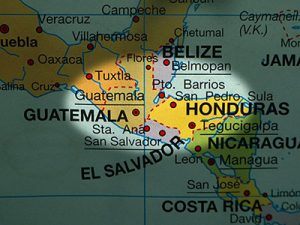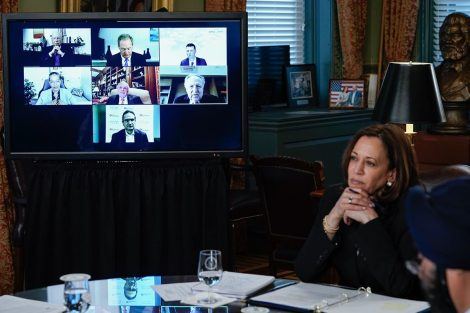For immediate release: May 27, 2021
Boston, MA – Recognizing the need for urgent, sustained action to improve global health care in the Northern Triangle countries of Honduras, Guatemala, and El Salvador, Harvard T.H. Chan School of Public Health announced today it is joining the Partnership for Central America, which is part of a U.S. government initiative led by U.S. Vice President Kamala Harris calling upon the private sector to deepen its investment in the Northern Triangle to promote economic opportunity and address root causes of migration in Central America.
Michelle A. Williams, dean of the faculty at Harvard Chan School, will serve on the Partnership for Central America’s Private Sector Leadership Council, along with 11 other prominent business and social sector leaders from around the globe.
The Partnership represents a vital component of the U.S. government’s strategy to support long-term development in the Northern Triangle region of Central America.
“As the Partnership’s leading academic institution, Harvard Chan School will bring dedicated experts to the Partnership in order to improve the lives of millions of women, men and children across the border,” Williams said. “Together with our government and corporate partners, we will work to improve access to health care as well as train and enable workers to help manage pipeline health care issues. Our ultimate goal is to foster transformative change across all communities, platforms, and sectors.”

Harvard Chan School has deep ties to the Northern Triangle region, with faculty and researchers providing technical assistance and project management alongside multiple global partners, from the World Health Organization to the Inter-American Development Bank. The School’s work includes leading reviews of patient-centered health care in El Salvador; evaluating community-based vector surveillance for Chagas disease in Guatemala, El Salvador, and Honduras; and developing training and implementation programs for malaria control in the region.
As the Partnership’s leading academic institution, Harvard Chan School will add scientific data to maximize capacity to measure and report systems-wide impact of the Partnership; improve access to healthcare; and train and enable workers to manage pipeline healthcare issues in the Northern Triangle.
Harnessing qualitative and quantitative metrics, the School will provide partners, funders, and managers with the means to pilot and then scale activities that support data-sharing in order to foster transformative change across all communities, platforms, and sectors.
Others serving on the Partnership’s Leadership Council include:
- Ajay Banga, chairman of Mastercard;
- Brad Smith, president of Microsoft;
- Guillame Le Cunff, CEO of Nespresso;
- Hamdi Ulukaya, CEO and founder of the Tent Partnership for Refugees;
- Helene Gayle, CEO of the Chicago Community Trust and former CEO of CARE;
- Jack Leslie, chairman of Weber Shandwick;
- Kenneth Hersh, president and CEO of the George W. Bush Presidential Center;
- Maria Cavalcanti, president and CEO of Pro Mujer;
- Ray Chambers, WHO Ambassador for Global Strategy and Health Financing;
- Luis Alberto Moreno, former president of the Inter-American Development Bank; and
- Iain Barton, CEO of the Clinton Health Access Initiative
Members of the Partnership will work in six key focus areas with an emphasis throughout on supporting vulnerable populations, including women and youth, in the Northern Triangle region. Focus areas include digital and financial inclusion, food security and climate-smart agriculture, climate adaptation and clean energy, education and workforce development, public health access, and a reform agenda to improve the environment for business.
Vice President Harris currently oversees diplomacy with the countries of El Salvador, Guatemala, and Honduras, including efforts to foster economic opportunity, strengthen governance, combat corruption, and improve security.
Photo of Central America map: Shutterstock
Visit the Harvard Chan School website for the latest news, press releases, and multimedia offerings.
For more information:
Nicole Rura
617.221.4241
nrura@hsph.harvard.edu
Meaghan Agnew
617.291.8284
magnew@hsph.harvard.edu
###
Harvard T.H. Chan School of Public Health brings together dedicated experts from many disciplines to educate new generations of global health leaders and produce powerful ideas that improve the lives and health of people everywhere. As a community of leading scientists, educators, and students, we work together to take innovative ideas from the laboratory to people’s lives—not only making scientific breakthroughs, but also working to change individual behaviors, public policies, and health care practices. Each year, more than 400 faculty members at Harvard Chan teach 1,000-plus full-time students from around the world and train thousands more through online and executive education courses. Founded in 1913 as the Harvard-MIT School of Health Officers, the School is recognized as America’s oldest professional training program in public health
